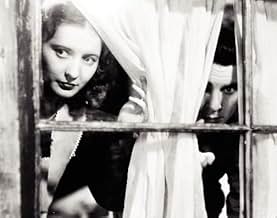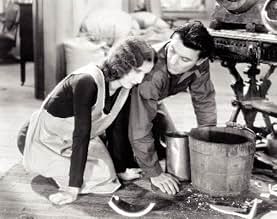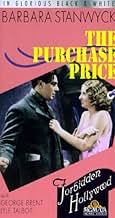IMDb-BEWERTUNG
6,4/10
2036
IHRE BEWERTUNG
Füge eine Handlung in deiner Sprache hinzuA torch singer becomes a farmer's mail-order bride.A torch singer becomes a farmer's mail-order bride.A torch singer becomes a farmer's mail-order bride.
- Regie
- Drehbuch
- Hauptbesetzung
Mae Busch
- Queenie - Girl on Train
- (Nicht genannt)
Nick Copeland
- Skins' Pal at Shivaree
- (Nicht genannt)
Mike Donlin
- Tom Buchanan - Man at Shivaree
- (Nicht genannt)
Harrison Greene
- Man in Hotel Lobby
- (Nicht genannt)
Crauford Kent
- A.C. Peters - The Banker
- (Nicht genannt)
Matt McHugh
- Waco - Fields' Henchman
- (Nicht genannt)
John 'Skins' Miller
- Skins - The Accordion Player
- (Nicht genannt)
Carlyle Moore Jr.
- Hotel Desk Clerk
- (Nicht genannt)
Edmund Mortimer
- Dance Extra
- (Nicht genannt)
William H. O'Brien
- Waiter in Opening Nightclub Scene
- (Nicht genannt)
Henry Otho
- Extra in Beer Hall and at Shivaree
- (Nicht genannt)
Empfohlene Bewertungen
The appeal of this somewhat run-of-the-mill film is Barbara Stanwyck in an early display of her mega-watt star power and her ability to turn mediocre material into something special.
Her character doesn't make much sense: a nightclub singer from the city who wants to get away from the bootlegger boyfriend hounding her and so agrees to an arranged marriage with a farmer up in the wilds of North Dakota! The bootlegger (played by Lyle Talbot) isn't threatening or abusive, so one wonders why Stanwyck needs to go to such great lengths to avoid him -- keep wondering, because the movie never explains it. But if you can swallow that, then you can easily swallow the fact that this urban good-time gal seems to know all about how to run a farm.
Which brings me back to Stanwyck. The movie's premise isn't remotely plausible, but Stanwyck somehow makes it so through the confidence of her performance. I really think she could make anything worth sitting through just for the pleasure of watching her.
The film does provide an interesting look at what farm life in the early days of the 1930s was like, a lifestyle I've only seen recreated in more modern-day movies.
Grade: B-
Her character doesn't make much sense: a nightclub singer from the city who wants to get away from the bootlegger boyfriend hounding her and so agrees to an arranged marriage with a farmer up in the wilds of North Dakota! The bootlegger (played by Lyle Talbot) isn't threatening or abusive, so one wonders why Stanwyck needs to go to such great lengths to avoid him -- keep wondering, because the movie never explains it. But if you can swallow that, then you can easily swallow the fact that this urban good-time gal seems to know all about how to run a farm.
Which brings me back to Stanwyck. The movie's premise isn't remotely plausible, but Stanwyck somehow makes it so through the confidence of her performance. I really think she could make anything worth sitting through just for the pleasure of watching her.
The film does provide an interesting look at what farm life in the early days of the 1930s was like, a lifestyle I've only seen recreated in more modern-day movies.
Grade: B-
This peculiar but interesting drama has Barbara Stanwyck as a weary nightclub torch singer with a "who cares?" attitude. To escape her underworld boyfriend, she decides to hide out in the bleak plains of North Dakota as a mail-order bride. As her shy farmer husband, the normally debonair George Brent is almost unrecognizable in a pair of overalls, but gives a sensitive characterization. The bulk of the plot follows the growing feeling between the reserved country mouse' and the tough city mouse', complicated by several villains. Tough guy director William Wellman keeps things moving at a clip, and uses his low budget wisely to stage several good set-pieces, including a drunken shivaree for the happy couple. In the supporting cast, Leila Bennett stands out as a plain-talking maid.
Sometimes I think you just have to be in the mood for certain films. This may have been one of those times. "The Purchase Price" from 1932, largely thanks to Barbara Stanwyck, is actually a very sweet film.
Stanwyck plays Joan, a torch singer, unhappy with her present life and the racketeer, Eddie Fields (Lyle Talbot) with whom she's involved. When she finds out that someone has used her photo and sent it off to be a mail-order bride, Joan decides to show up in person and takes off.
She ends up in farm country with Jim Gilson (George Brent) who's in debt up to his eyebrows. However, over the years, he has developed an excellent grain seed - if he can stave off the creditors until the next planting season, he'll be okay.
To Joan's credit, she settles in, determined to make him a good wife and to be a good neighbor, and she falls in love with Jim. When her ex-beau shows up, Jim jumps to some wrong conclusions.
Barbara Stanwyck is great in this, giving a warm, sincere performance. She is glamorous in the first few scenes (though boy, she can't sing), and she remains sexy and pretty even plainly dressed on the farm, causing a lot of men to notice her and make dumb old Jim jealous.
This is a different kind of role for George Brent, who soon would be well-dressed, mustached, and sophisticated as he played opposite Bette Davis. Here he's an oaf.
The movie is short and moves quickly. Stanwyck's performance helps give a freshness to a story that was old even back in 1932.
Stanwyck plays Joan, a torch singer, unhappy with her present life and the racketeer, Eddie Fields (Lyle Talbot) with whom she's involved. When she finds out that someone has used her photo and sent it off to be a mail-order bride, Joan decides to show up in person and takes off.
She ends up in farm country with Jim Gilson (George Brent) who's in debt up to his eyebrows. However, over the years, he has developed an excellent grain seed - if he can stave off the creditors until the next planting season, he'll be okay.
To Joan's credit, she settles in, determined to make him a good wife and to be a good neighbor, and she falls in love with Jim. When her ex-beau shows up, Jim jumps to some wrong conclusions.
Barbara Stanwyck is great in this, giving a warm, sincere performance. She is glamorous in the first few scenes (though boy, she can't sing), and she remains sexy and pretty even plainly dressed on the farm, causing a lot of men to notice her and make dumb old Jim jealous.
This is a different kind of role for George Brent, who soon would be well-dressed, mustached, and sophisticated as he played opposite Bette Davis. Here he's an oaf.
The movie is short and moves quickly. Stanwyck's performance helps give a freshness to a story that was old even back in 1932.
If you stop to think about the actual story you'll realise that it's the most ridiculous thing you've ever seen. Fortunately William Wellman directs this at such breakneck speed you don't have time to stop - you're whisked along on the Wellman express.
That all this can happen in 68 minutes is crazy but this was Warner's specialty in the early thirties. They were brilliant at it and this is a great example. It's not a fantastic picture but it is so typical of those fast moving features of pure entertainment Darryl Zanuck knew his audiences would lap up. If good quality early thirties movies are your thing, this will tick your boxes. Even though the setting isn't the usual mean streets of New York, it's still got all the usual ingredients.
A common ingredient of pre-code films that's present in this is the overriding importance of marriage. Although in pictures like this it's the single most vital thing in the world for a girl - which must have reflected reality, it seems completely unimportant who they marry as long as they can provide food and shelter. It's irrelevant whether he's a gangster, a decrepit pensioner or in this case, a complete stranger who advertised for a wife (essentially a housekeeper) in an agency. Disturbingly, mail order brides are still around today. Anyway...
One of those other usual key ingredients is George Brent. He's his usual dull self but for a change, that bland personality is suited to this role. Fortunately 'the other man' in the love triangle is Lyle Talbot who always adds some slightly shady charisma. These two however are definitely second fiddle to the absolute star of this picture, Barbara Stanwyck.
She effortlessly melds her gangster-moll persona to devoted farmer's wife as though it's the most transition in the world. Were this role be played by a lesser actress (and directly a lesser director) it could have been a joke picture because the premise is so stupid but she (and Wellman) make it seem completely believable and therefore thoroughly enjoyable.
As in all her thirties pictures (apart from the monstrous Stella Dallas) despite not having the classic Hollywood looks, she inexplicably oozes enough sex appeal to fuel the planet for a hundred years. She certainly had 'it.' This isn't one of her best films but it's still pretty decent - and she's absolutely lovely in it.
That all this can happen in 68 minutes is crazy but this was Warner's specialty in the early thirties. They were brilliant at it and this is a great example. It's not a fantastic picture but it is so typical of those fast moving features of pure entertainment Darryl Zanuck knew his audiences would lap up. If good quality early thirties movies are your thing, this will tick your boxes. Even though the setting isn't the usual mean streets of New York, it's still got all the usual ingredients.
A common ingredient of pre-code films that's present in this is the overriding importance of marriage. Although in pictures like this it's the single most vital thing in the world for a girl - which must have reflected reality, it seems completely unimportant who they marry as long as they can provide food and shelter. It's irrelevant whether he's a gangster, a decrepit pensioner or in this case, a complete stranger who advertised for a wife (essentially a housekeeper) in an agency. Disturbingly, mail order brides are still around today. Anyway...
One of those other usual key ingredients is George Brent. He's his usual dull self but for a change, that bland personality is suited to this role. Fortunately 'the other man' in the love triangle is Lyle Talbot who always adds some slightly shady charisma. These two however are definitely second fiddle to the absolute star of this picture, Barbara Stanwyck.
She effortlessly melds her gangster-moll persona to devoted farmer's wife as though it's the most transition in the world. Were this role be played by a lesser actress (and directly a lesser director) it could have been a joke picture because the premise is so stupid but she (and Wellman) make it seem completely believable and therefore thoroughly enjoyable.
As in all her thirties pictures (apart from the monstrous Stella Dallas) despite not having the classic Hollywood looks, she inexplicably oozes enough sex appeal to fuel the planet for a hundred years. She certainly had 'it.' This isn't one of her best films but it's still pretty decent - and she's absolutely lovely in it.
Of course this delicious tour-de-force is totally incredible... but WOW! You can't take your eyes off the screen in case Wellman gives his heroine whiplash as she moves from plushly-kept woman in Manhattan to mail-order farmer's bride in North Dakota. From take-out at Tiffany's to hauling coal nuggets 20 miles through a blizzard. From igniting the lust in men with her daring chanteusing to putting out the fire villains set to her and hubby George Brent's last-hope crop of wheat. All in just over 60 minutes!
Wusstest du schon
- WissenswertesDuring the wheat-burning scene a stand-in was used instead of Barbara Stanwyck, but she didn't think the stand-in acted as the character so Stanwyck decided to play it herself. This resulted in her getting some burns on her legs, but she never complained.
- PatzerWhen Barbara Stanwyck gets off the train in North Dakota the terrain is very mountainous. North Dakota is on the Great Plains - very flat.
- Zitate
Eddie 'Ed' Fields: Ya daffy little tahmata, I'm bugs about ya. I'd marry ya myself, if I wasn't already married.
- VerbindungenFeatured in Barbara Stanwyck: Fire and Desire (1991)
- SoundtracksTake Me Away
(1932) (uncredited)
Music by Peter Tinturin
Lyrics by Sidney Clare and Charles Tobias
Played during the opening credits and at the end
Sung by Barbara Stanwyck at the nightclub
Played as background music often
Top-Auswahl
Melde dich zum Bewerten an und greife auf die Watchlist für personalisierte Empfehlungen zu.
- How long is The Purchase Price?Powered by Alexa
Details
- Erscheinungsdatum
- Herkunftsland
- Sprache
- Auch bekannt als
- The Purchase Price
- Drehorte
- Produktionsfirma
- Weitere beteiligte Unternehmen bei IMDbPro anzeigen
Box Office
- Budget
- 202.000 $ (geschätzt)
- Laufzeit
- 1 Std. 8 Min.(68 min)
- Farbe
- Sound-Mix
- Seitenverhältnis
- 1.37 : 1
Zu dieser Seite beitragen
Bearbeitung vorschlagen oder fehlenden Inhalt hinzufügen



































